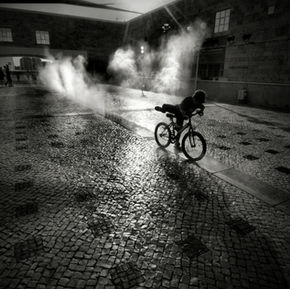FOTOTECA SIRACUSANA
PHOTOGALLERY - FOTOGRAFIA VINTAGE - BIBLIOTECA TEMATICA - CAMERA OSCURA B&W - DIDATTICA
SCRIPTPHOTOGRAPHY

RUI PALHA
Ode all’imperfezione. Osservando le fotografie di Rui Palha sembra che il fotografo abbia in qualche modo voluto rispondere a un suo celeberrimo connazionale, José Saramago. Nel suo “Lisbona” il premio Nobel gettava il suo sguardo malinconico su una città sacrificata allo sviluppo: “I ricostruttori di Lisbona”, scrive Saramago, “ci hanno lasciato questa piazza. O già sapevano che e avremmo avuto bisogno per metterci le automobili, o ingenuamente confidarono nella nostra immaginazione che, come chiunque può verificare, è nulla. Forse perché l’automobile ha finito per occupare proprio il posto che spettava all’immaginazione”.
Un dialogo a distanza tra il fotografo e lo scrittore tenta di ristabilire l’equilibrio tra gli uomini e la modernità. La street photography di Rui Palha ha dentro qualcosa di sostenibile, e infatti è ben lontana dalle vertigini sovraffollate delle strade amate dai suoi colleghi americani ed europei. La street di Rui Palha ha più a che vedere con le nostalgie fumose e malinconiche di Fan Ho all’incontro con l’attimo di Cartier-Bresson: pochi automezzi, poche persone e quando ve ne sono di più non è difficile percepire una somma di solitudini.
C’è, a ben vedere, un volontario rigore “imperfetto”, una nota che profuma di quella melancolia che siamo soliti attribuire ai portoghesi, quasi un intenzionale smarrimento domestico. Eppure in accordo a Pessoa, un altro monumento della letteratura portoghese, è l’imperfezione stessa il preludio al divenire: “Tutto è imperfetto. Non c’è tramonto così bello da non poterlo essere di più”.
Il respiro fotografico è – fatta salva la naturale esuberanza di bambini al gioco – naturalmente lento, quasi a recuperare il rapporto tra l’uomo e uno spazio urbano volto a straniarne i giorni; ed è in questa sintesi che va interpretata l’esiguità dei soggetti, i quali, immersi negli spazi da egli stesso costruiti, lotta per ritrovare la propria identità. Una scelta, un linguaggio efficace: l’uomo è fagocitato e dialoga a fatica con uno spazio le cui asperità diventano affilate, secche, geometriche come una scacchiera nella quale muoversi come pedine. La metafora è riuscita. E’ profonda; e nella quale vediamo il volto di Lisbona, una città incredibilmente poetica il cui passato è stretto tra le maglie di una contemporaneità sbilenca. E da questa doppiezza, da questa “maestà irregolare” della città nascono le fotografie di strada di Rui Palha, le cui vie, le piazze, gli angoli angusti narrano, qui come altrove, lo stesso avvertibile malessere. Ma il Portogallo è la casa del Fado, le cui melodie malinconiche somigliano ai portoghesi e dunque attraversate da una “allegra tristezza” che ne ridimensiona il dolore. Anche questa è una “imperfezione”.
Giuseppe Cicozzetti
foto Rui Palha
Ode to imperfection. Looking at the Rui Palha’s photographs it seems that the photographer somehow wanted to respond to one of his famous compatriots, José Saramago. In his "Lisbon" the Nobel Prize cast his melancholy gaze on a city sacrificed to development: "The Lisbon reconstructors", writes Saramago, "have left us this square. Or they already knew that and we would need to put the cars on, or they naively trusted in our imagination that, as anyone can verify, it is nothing. Perhaps because the car ended up occupying the place for the imagination ".
A distance dialogue between the photographer and the writer attempts to restore the balance between men and modernity. Rui Palha's street photography has something sustainable inside, and in fact it’s far from the overcrowded dizziness of the streets loved by his American and European colleagues. The “street” of Rui Palha has more to do with the smoky and melancholy nostalgia of Fan Ho at the meeting with the moment of Cartier-Bresson: few vehicles, few people and when there are more it is not difficult to perceive a sum of solitudes.
On closer inspection, there’s a voluntary "imperfect" rigor, a note that smells of the melancholy that we usually attribute to the Portuguese, almost an intentional domestic loss. Yet according to Pessoa, another monument of Portuguese literature, imperfection itself is the prelude to becoming: "Everything is imperfect. There’s no sunset so beautiful that it can not be more ".
The photographic breath is - without prejudice to the natural exuberance of children at play - naturally slow, almost to recover the relationship between man and an urban space aimed at strangling the days; and it is in this synthesis that the exiguousness of the subjects must be interpreted, who, immersed in the spaces he has built himself, struggles to rediscover his own identity.
A choice, an effective language: man is engulfed and dialogues with difficulty with a space whose asperities become sharp, dry, geometric like a chessboard in which to move like pawns. The metaphor is successful. It’s profound; and in which we see the face of Lisbon, an incredibly poetic city whose past is caught between the links of a lopsided contemporary.
And from this duplicity, from this "irregular majesty" of the city are born the street photographs of Rui Palha, whose streets, squares, narrow corners narrate, here as elsewhere, the same unmistakable malaise. But Portugal is the home of Fado, whose melancholy melodies resemble the Portuguese and therefore crossed by a "happy sadness" that resizes the pain. This is also an "imperfection".
Giuseppe Cicozzetti
ph. Rui Palha








